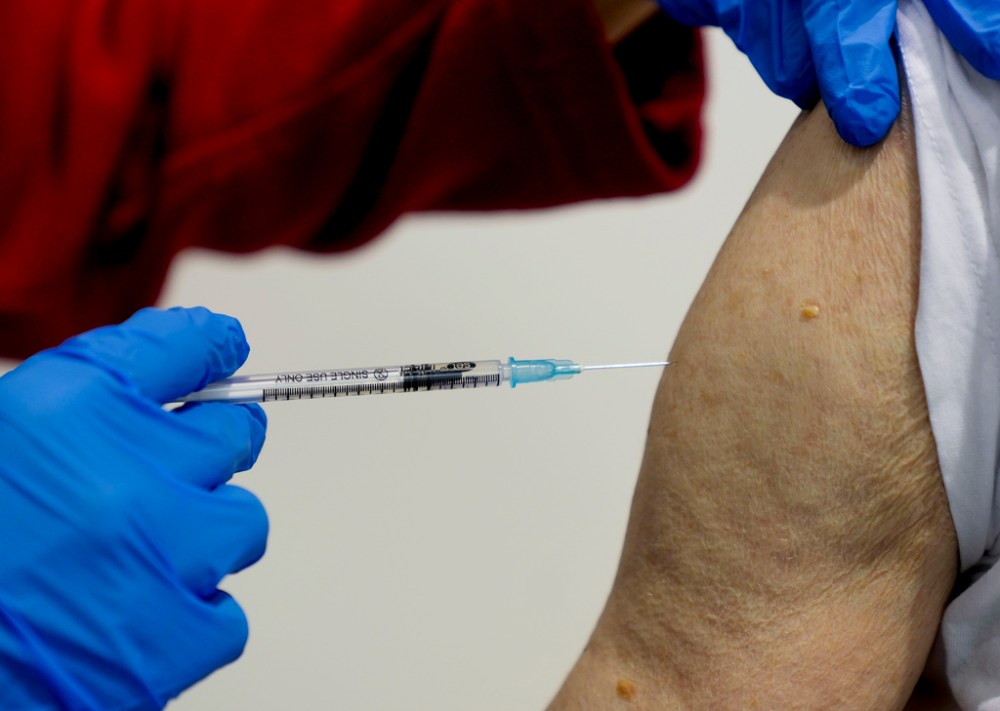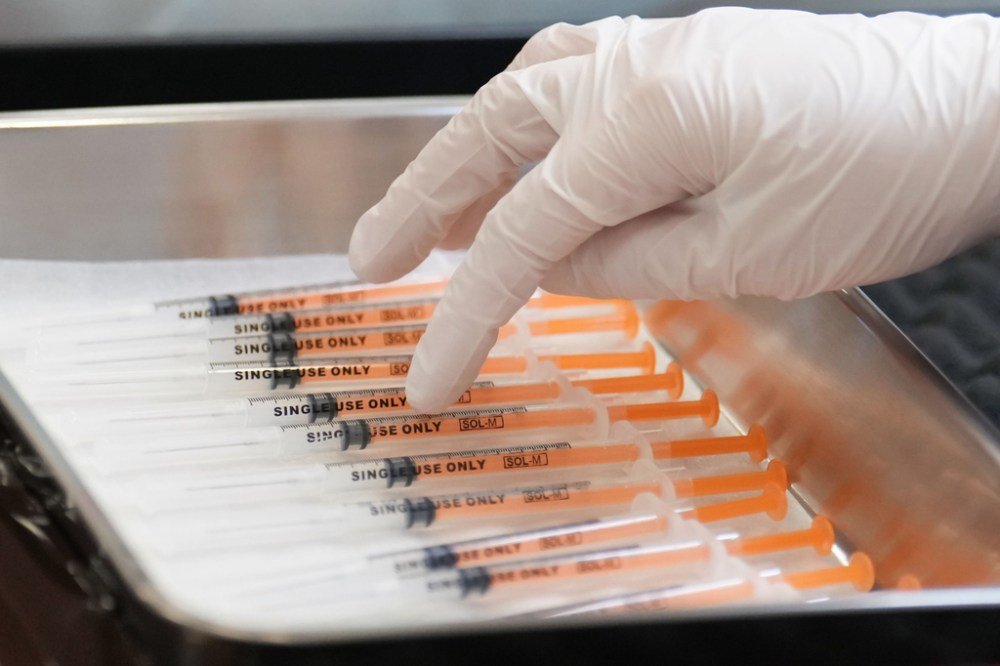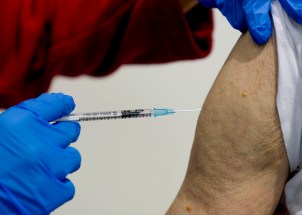Manitobans urged to get boosted as COVID subvariant rages
Read this article for free:
or
Already have an account? Log in here »
To continue reading, please subscribe:
Monthly Digital Subscription
$0 for the first 4 weeks*
- Enjoy unlimited reading on winnipegfreepress.com
- Read the E-Edition, our digital replica newspaper
- Access News Break, our award-winning app
- Play interactive puzzles
*No charge for 4 weeks then price increases to the regular rate of $19.00 plus GST every four weeks. Offer available to new and qualified returning subscribers only. Cancel any time.
Monthly Digital Subscription
$4.75/week*
- Enjoy unlimited reading on winnipegfreepress.com
- Read the E-Edition, our digital replica newspaper
- Access News Break, our award-winning app
- Play interactive puzzles
*Billed as $19 plus GST every four weeks. Cancel any time.
To continue reading, please subscribe:
Add Free Press access to your Brandon Sun subscription for only an additional
$1 for the first 4 weeks*
*Your next subscription payment will increase by $1.00 and you will be charged $16.99 plus GST for four weeks. After four weeks, your payment will increase to $23.99 plus GST every four weeks.
Read unlimited articles for free today:
or
Already have an account? Log in here »
Hey there, time traveller!
This article was published 06/04/2022 (1345 days ago), so information in it may no longer be current.
Calls for Manitobans to get triple- or quadruple-vaccinated against COVID-19 have taken on greater urgency now that the highly contagious Omicron subvariant BA.2 appears to be the dominant strain in Manitoba.
Premier defends weekly COVID reports
Premier Heather Stefanson stands by her government’s decision to limit COVID-19 data reporting to a weekly basis, saying the change came at the recommendation of public health.
“As we’re learning to live with COVID, I know other provinces have gone to weekly reporting, some are at monthly reporting, and we believe that that is an adequate and sufficient way of reporting this,” Stefanson said.
Premier Heather Stefanson stands by her government’s decision to limit COVID-19 data reporting to a weekly basis, saying the change came at the recommendation of public health.
“As we’re learning to live with COVID, I know other provinces have gone to weekly reporting, some are at monthly reporting, and we believe that that is an adequate and sufficient way of reporting this,” Stefanson said.
The province publishes weekly epidemiology and surveillance reports on Thursday mornings.
“What the public needs to know, obviously, is what the trends are with COVID in the province of Manitoba, and that’s what the weekly updating and reporting will give them, so they can make decisions based on that information,” she said.
Stefanson deferred additional questions to chief provincial public health officer Dr. Brent Roussin, who is set to hold a media availability before the end of the week. Roussin has not made a public address since March 16 and has not been made available to answer questions from reporters.
Pressed to explain why the province stopped providing COVID-19 case counts for personal care homes after a government announcement was switched to a new location due to an outbreak, Stefanson said families, staff and residents who need to know about cases are appropriately informed.
“The information is getting out to those who need it, when they need it,” she said.
— Staff
Dr. Julie Lajoie, a research associate who works in virology and immunology at the University of Manitoba, said a third dose is essential to be well protected against severe COVID disease and death.

“The (vaccine) efficacy against severe disease remains good after a few months, which is good news and why people must go get that third dose if not done yet and eligible,” she said.
Manitobans should continue to take precautions such as staying home if they’re ill and wearing face masks in indoor public places, after the province lifted public health restrictions last month, Lajoie said.
A government spokesperson said BA.2 appears to have replaced BA.1 as Manitoba’s dominant variant based on recent genome sequencing of positive tests.
The province sequences about 200 positive tests a week, or about 10 to 15 per cent of the overall total, a spokesperson said.
In the latest run, 60 per cent came back as BA.2 infections.
“Two doses remains effective at preventing severe outcomes for the vast majority of individuals,” the spokesperson said. “Getting a booster dose will increase that protection as well as protection against severe disease. Vaccination continues to be the best option to protect yourself and others.”
University of Saskatchewan epidemiologist Dr. Nazeem Muhajarine said research suggests BA.2 is 30 to 50 per cent more contagious than the original Omicron, BA.1, which fuelled recent waves in Canada and around the world.
Studies do not suggest BA.2 is more lethal or causes more severe illness than BA.1, he said.
Research has found two vaccine doses are less effective against BA.2 than previous variants, but a booster can restore protection that has waned naturally.
Boosters are shown to reduce the risk of COVID hospitalization and death, said Muhajarine.
“This tells us that we really need to get people to get their booster dose,” he said.
There are concerns about the pace of Manitoba’s booster uptake. As of Tuesday, 44.8 per cent of Manitobans had had a third dose, the province said.
The total was 41 per cent as of Feb. 28, according to last week’s COVID surveillance report.

“The problem for Manitoba is there are a lot of people who haven’t had a third dose,” said Liberal Leader Dougald Lamont. “There’s a certain sense of fatigue. It’s very dangerous. We need to be ramping up vaccinations.”
Canada’s booster uptake has slowed down, as governments lift restrictions and tell the public it’s time to “live with the virus,” said Muhajarine.
“It’s unfortunate, but kind of predictable because provinces have been pivoting to a normalization of COVID-19, making it like how we would respond to any respiratory infection,” he said. “People take their cues from governments and public health leaders.”
Winnipeg emergency room physician Dr. Doug Eyolfson, a former Liberal member of Parliament, said the return of a vaccine mandate would encourage uptake.
Eyolfson, who is still seeing seriously ill COVID patients in hospital, implored unvaccinated people to get their shots.
NDP health critic Uzoma Asagwara said the province needs to be more “transparent” with COVID data, after getting rid of its online dashboard and replacing weekday updates with weekly reports, so Manitobans can assess personal risk.
As Manitoba expanded fourth-dose eligibility Wednesday to care home residents, people over 70 and Indigenous people over 50, Premier Heather Stefanson encouraged everyone to get “fully vaccinated” and seek a third dose, if eligible.
“We know that vaccination is our best defence against this virus,” she said.
All adults are eligible for a third dose. Children aged 12 and older can get a booster shot if they are deemed to be at a high risk of severe illness from COVID.
Initially dubbed the “stealth” variant because it was tougher to track in positive PCR tests, BA.2 was expected to overtake BA.1 in Manitoba, given trends elsewhere.
In an epidemiology report published Tuesday, the World Health Organization said BA.2 is dominant in all six of its regions.
The agency said higher rates of reinfection have been reported for Omicron than other variants.

In February, a study by Denmark’s Statens Serum Institut found BA.2 can reinfect people who already had BA.1, but it is rare.
“It is possible for individuals to be reinfected with COVID-19,” the Manitoba government spokesperson said. “Evidence suggests that individuals who have recovered from Omicron have lower protection from infection than other variants.”
Scientists say Omicron variants aren’t as severe as the Delta variant, the previous dominant version that spawned waves around the world.
However, BA.1 and BA.2 are believed to be far more transmissible, and rapid spread has put health-care systems under strain.
Manitoba reported a record number of COVID patients in hospital — 744 on Feb. 2 — during the Omicron-fuelled winter wave.
“It’s a huge mistake to think (Omicron) is milder because the reality is when everyone gets it at the same time, things start to crash,” said Lamont.
“If there are more cases, even if less severe than Delta, the load of cases can get to be too many real fast,” said Lajoie. “We must do our best to prevent cases.”
chris.kitching@freepress.mb.ca
Twitter: @chriskitching
As a general assignment reporter, Chris covers a little bit of everything for the Free Press.
Our newsroom depends on a growing audience of readers to power our journalism. If you are not a paid reader, please consider becoming a subscriber.
Our newsroom depends on its audience of readers to power our journalism. Thank you for your support.







